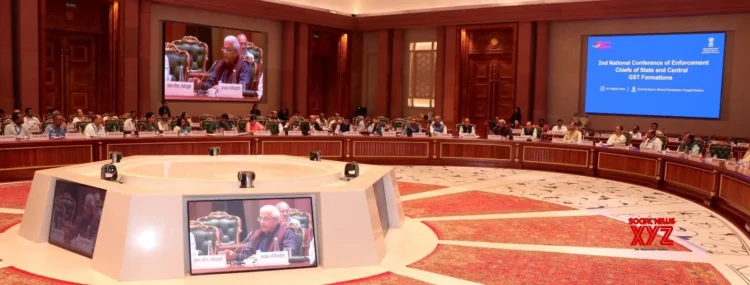The government has launched a special drive by Central and state GST formations to identify and weed out fake GST registrations that are being used for massive ITC (input tax credit) frauds, a top official said on Tuesday.
Revenue Secretary Sanjay Malhotra exhorted the Central and state GST formations to focus on the fake registrations during this two-month special drive and stressed on the need to track the masterminds and beneficiaries of fake ITC so that strict action is taken to have the necessary deterrence effect.
Addressing a meeting of the second edition of the National Conference of Enforcement Chiefs of the State and the Central GST Formations here, he said that the recent changes implemented in the GST returns such as GSTR-1A would further aid the efforts of tackling GST evasion in a systematic manner.
The Conference was attended by senior officers of the Department of Revenue, the Central Board of Indirect Taxes and Customs (CBIC), Commissioners of Commercial Tax (CCT), and GST Enforcement Chiefs of the States and the CEO and officers of GSTN.
Other enforcement and intelligence authorities like the Central Board of Direct Taxes (CBDT), Directorate of Enforcement (ED), Directorate of Revenue Intelligence (DRI), Financial Intelligence Unit (FIU-IND) and Central Economic Intelligence Bureau (CEIB) also participated in the deliberations.
In his address on the occasion, the Revenue Secretary stressed the importance of maintaining a fine balance between enforcement actions and ease of doing business.
During the one-day conference, various presentations were also made by the GST formations. Action taken report of the actions identified in the first edition of the conference held in March 2024 was reviewed and the formations were advised to continue their efforts in ensuring that the actions are completed. The participants were acquainted with the details of the 2 months’ special drive on fake registrations which was launched on August 16.
This drive will be undertaken in a coordinated manner between the Central and state formations. Based on certain identified risk parameters, close to 59,000 potential fake firms have been identified for verification and further enquiry.
The CEO, GSTN made a presentation on various technological initiatives to tackle the issue of evasion while at the same time ensuring business facilitation is not hampered. In his presentation, the DG, Directorate General of GST Intelligence (DGGI) said that it has detected fake ITC evasion of Rs 1,20,000 crore from the year 2020 till date with special emphasis being laid on identifying and apprehending the masterminds and disrupting syndicates, operating across the country; with 170 such masterminds have been apprehended already.
Some of the best practices/guidelines issued to bring uniformity in action and ensure ease of doing business were also deliberated.
Commissioner of Maharashtra State GST showcased the GST Enforcement Management System (GEMS) implemented in the state to ensure that the enforcement actions are properly tracked and closed so that there is transparency in the process and demands are crystallised within a reasonable time paving the way for a higher probability of recovery of evaded taxes.
During the focussed thematic sessions, zonal units of the DGGI/CBIC presented various case studies on misuse of APMC accounts, fintech companies, clandestine clearances, issues in the financial sector, taxation of emerging service sectors such as cryptos, NFTs, TDRs etc.
Chief Commissioner Tax (CCT), Gujarat, discussed the modes of evasion detected in manpower supply services and presented the learnings and way forward. Officials from West Bengal presented the enforcement cases in the real estate sector while Karnataka SGST officers shared their experience in leveraging interdepartmental data for enhanced evader detection.
CCT, Rajasthan, presented various enforcement case studies; while CCT, Tamil Nadu elaborated on the state’s efforts in state-wide surprise enforcement operations against bill traders, street surveys conducted, and a unique process of detecting fake registrants by sending a friendly welcome letter to new registrants.
Setting the context of the one-day conference, CBIC Chairman Sanjay Agarwal recalled the discussion in the first edition of the conference and emphasised the need for enforcement agencies to stay ahead of the evaders so that the sanctity of the GST system is preserved. He advised the enforcement units to focus on real evasion rather than interpretative issues and general industry practice.
In his welcome address, Additional Secretary, Revenue, Vivek Agarwal expected that the participating officers would benefit from the agenda which includes discussion on sector-specific enforcement issues, emerging issues in enforcement and techniques to tackle evasion. He stressed the importance of following up on the actions identified so that the useful purpose of the deliberations in the conference is achieved.
Various participants stressed the need for building a national register of enforcement actions so that real-time information gets disseminated to all enforcement units in the Centre and state formations.
Taking a cue from the ‘Samvad’ sessions conducted by Rajasthan and street surveys conducted by Tamil Nadu, the Revenue Secretary underscored the importance of being continuously connected to the trade and business in the field reducing the need for intrusive enforcement action and enabling proactive compliance.























